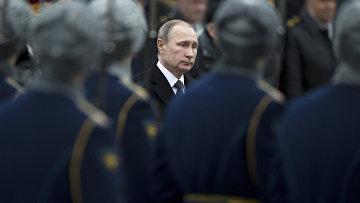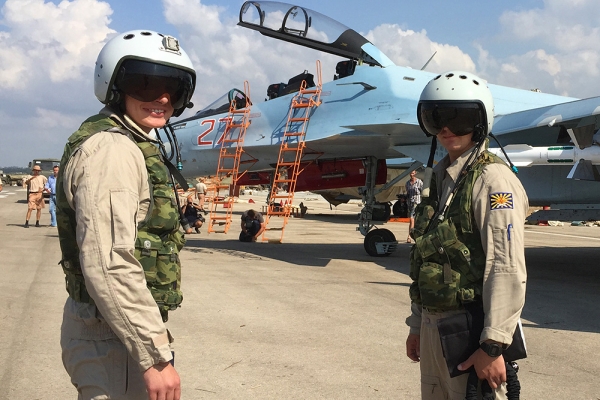 the <small>© RIA Novosti, Victoria Ivanova</small>
the <small>© RIA Novosti, Victoria Ivanova</small>
Russia is less militarily strong, but she is much more willing to act, and it changed the dynamics in the middle East
10.05.2016
(Dennis Ross)
Currently the US military potential in the middle East greatly surpasses Russia’s military potential in the region is now 35 thousand American soldiers, hundreds of American planes and only 2 thousand Russian soldiers and about 50 Russian aircraft. However, the leaders of middle Eastern countries travel to Moscow to meet with Vladimir Putin, and not in Washington. Two weeks ago to Moscow there has arrived the Prime Minister of Israel Benjamin Netanyahu (Benjamin Netanyahu) — this is his second trip to Russia since last fall — and soon Saudi Arabia’s king Salman is also expected to visit Moscow. Egypt’s President and other leaders of middle Eastern countries also went to Russia to meet with Putin.
Why is this happening? And why during my trips to the middle East I often hear that the Arabs and the Israelis abandoned the idea to seek support from President Barack Obama? Because the relationship is much more important forces: the Russians have shown their willingness to use force, to influence the balance of power in the region, and we are not.
Putin’s decision to intervene in the Syrian conflict allowed the company to significantly strengthen the position of President Bashar al-Assad and has significantly reduced the extent of Russia’s isolation, imposed upon her after the annexation of Crimea and intervention in the conflict in Eastern Ukraine. In addition, Putin’s worldview is completely contrary to the worldview of Obama. Obama believes that the use of force is justified only if under the direct threat is the security of the United States. His worldview allows for preventive action against terrorists and the use of tough measures in the fight against “Islamic state”. However, Obama articulates U.S. interests and situations requiring the use of force to enforce them, in very narrow terms. This is a reflection of the lessons that the President learned from the wars in Iraq and Afghanistan, and explains why he didn’t want to take decisive action in Syria to the moment when the war has provoked a humanitarian catastrophe — the immigration crisis, threatening the foundations of the European Union — and the rise of the “Islamic state”. It also explains why he believes that Putin can not win as a result of its military campaign in Syria.x

However, the middle East is Putin’s views on the use of force, including the use of force to achieve political goals, are the norm, not the exception — and this applies to both our enemies and our friends. Saudi Arabia started to operate in Yemen, largely because of fears that the United States does not want to limit the extension of Iran’s influence in the area: she felt the need to draw lines of their own. After signing the agreement on the nuclear program Iran’s behavior in the region has become more aggressive, and now to the Guardians of the Islamic revolution in Syria joined by soldiers of the regular army of Iran, Shiite groups have intensified, Iran smuggling weapons to Bahrain and the Eastern province of Saudi Arabia, and even conducts ballistic missile tests.
Russia’s presence did not help. Russia’s military intervention changed the balance of power in Syria and, in contrast to the opinion of Obama, has put the Russians in a strong position, not requiring any major investments. Russia not only was not punished for his invasion of Syria: now the President calls Vladimir Putin, and asks for his help in putting pressure on the Assad regime — thereby recognizing that Putin enjoys considerable influence in the region. The leaders of middle Eastern countries also recognize this, realizing that they need to talk with Russia, if they want to protect their interests. Undoubtedly, it would be much better if the whole world held those views on the nature of power, which Obama adheres to. It would be much better if Putin suffered defeat in the international arena. But this is not happening.
This does not mean that we are weak and Russia is strong. Currently Russia’s economy is weakening, and the low oil prices worsen its financial problems. Perhaps this even partly explains the desire Putin to boost Russia’s prestige on the world stage and its show of force in the middle East. However, even the recent Obama’s trip to Saudi Arabia had not changed their conviction that America is weakened and no longer wants to maintain the balance of power in the region. The Gulf States fear Iran’s growing influence in the region more than they fear ISIS and they believe that the US administration was prepared to accept Iran’s right to claim supremacy in the region. Immediately after the appearance of the US President at the summit of the cooperation Council of the Gulf countries Abdulrahman al-Rashid (Abdulrahman al-Rashed), journalist, closely associated with Saudi leaders, wrote: “Washington can’t open doors to Iran, allowing it to threaten other countries in the region… and while demand from these countries, so they silently watched”.
During his trips to the middle East I often hear that the Arabs and the Israelis are already looking forward to coming to power, the next US administration. They understand that in matters of maintaining stability on Russia to rely not worth it, and they expect that this role will take over the United States. Ironically, since Obama has shown unwillingness to use his power in the region, many of our traditional partners realized that they will have to act independently. It’s not bad unless it causes them to make such moves that may be counterproductive. For example, if Saudi Arabia would be more confident about our readiness to confront the Iranian threat in the region, she would have taken the decision to start the war in Yemen — war in which is very difficult to beat and that resulted in a giant costs? Obama rightly believes that regional actors should assume a more active role in the fight against ISIS. However, unfortunately, he was wrong, believing that they will do so, seeing our reluctance to see the threat that is hanging over them, and to doubt our reliability.
While they doubt the reliability of America, will face restrictions on how they show themselves — whether in the fight against “Islamic state”, in response to insistent offers or Russia in search of a compromise between the Palestinians and Israelis. To be able to take on more responsibility and has agreed to take more serious risks, they will have to believe that America keeps its word and that the statements about “red lines” will no longer be empty words that do not have any reinforcements. They will need to believe that we see the same threats, and that the American leaders understand that only force able to change and maintain balance in the region, and would not hesitate to use it if necessary.
To form such a relationship to the United States, you need to take the following steps:
• Need to tighten our declared policy toward Iran, writing the consequences of violations of the terms of the Joint comprehensive action plan and to include clear, unambiguous provisions for the use of force — and not the imposition of sanctions if the Iranians violate his promise not to create and not to acquire nuclear weapons.
• There is a need to start developing contingency plans for unforeseen circumstances, together with the countries members of the cooperation Council of Persian Gulf States, and Israel to make a clear plan of countering Iran, which is now increasingly relied on Shiite militias to destabilize regimes in the region. (Readiness to hold a trilateral discussions with Arab and Israeli military planners will be the signal that we recognize the existence of this threat, the new strategic realities and potential new ways to counter the threats from radical Shiites and Sunnis.)
• You must be ready to provide weapons to Sunni tribes in Iraq, if Iran and the dominant group will continue to interfere with Prime Minister Haider al-Abadi (Haider al-Abadi) to do it.
• In Syria is necessary to make clear that if Russia continues to support Assad and will not force him to fulfill the conditions on which the parties have agreed in Vienna (ceasefire, open humanitarian corridors, commencement of negotiations and the political transition), we will have no choice but to create safe havens and no-fly zone in cooperation with our partners.
Putin and the leaders of the countries of the Middle East understand the logic of coercion. It’s time again to apply it.








